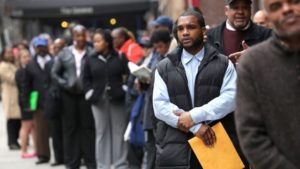
For the Black community, it’s a practice that feels designed to keep Black people trapped in poverty.
Limited access to quality education, discriminatory practices by mortgage lenders and racial biases on behalf of hiring managers have long been acknowledged as some of the ways Black people are left struggling to get the same economic benefits and financial opportunities that are more available to their white counterparts.
What some members of the Black community may not have been aware of, however, is the fact that nearly half of America’s major businesses use credit checks that keep Black applicants away from certain positions.
At least that’s how some political figures and other advocates view it.
New America Foundation’s Hannah Emple explained that using credit checks to make hiring decisions is only keeping poor Americans who need work trapped in poverty—a vicious cycle that disproportionately targets the Black community.
“The most insidious and alarming part of the rise in credit-check use stems from its ostensibly race-neutral façade,” Emple told The Root. “People of color are more likely to have poor credit because of historical and contemporary forms of discrimination that limit educational, employment, borrowing and housing opportunities.”
She added that the credit checks are used as a way of “operationalizing racial discrimination in a supposedly race-neutral way that will stand up to legal scrutiny until we make it illegal.”
So when questions arise about the lack of diversity in new hires, corporations are able to hide their tendency to consider skin complexion behind a faux concern for credit history.
It’s a racially biased system that, in more ways than one, just doesn’t make sense.
Consider the fact that studies suggest people who are “undergoing financial distress” tend to work much harder because they have a specific goal of paying off their debt, Center for American Progress’ Joe Valenti told The Root.
It’s that type of thinking that even led Shark Tank’s Barbara Corcoran to reveal that she doesn’t tend to “invest in rich kids’ businesses.”
Instead, she said, she finds more hope in entrepreneurs who are facing financial struggles and desperately want to work to find a way out of debt.
But by stripping employment opportunities away from the people who need it the most, the credit checks for employment method is only shoving people “deeper and deeper into debt,” Valenti adds.
These low-income citizens, often Black, are never given the chance to prove their work ethic and at least start working toward financial stability.
The push to eliminate this practice has been virtually nonexistent, although some political figures have made it a point to try to fight back against such injustices.

California’s Rep. Maxine Waters shared these sentiments.
As the representative for one of California’s largest concentrations of people of color, Waters has been actively trying to give low-income Americans a better chance at passing the credit check test when seeking employment.
Waters has already introduced her Fair Credit Reporting Improvement Act back in 2014 that would have reduced bad credit scores from seven to four years and removed settled debts from the reports.
This wouldn’t necessarily stop credit checks for employment purposes, but it would give a substantial boost to some applicants’ credit scores and allow them to meet the requirements set by potential employers.
Overall, however, the battlefield for eliminating this racially biased hiring practice is still and quiet.
Until uproar sweeps the tranquil landscape, more Black residents will continue to be trapped in a horrendous cycle that leaves them out of a job and far from economic opportunity.


